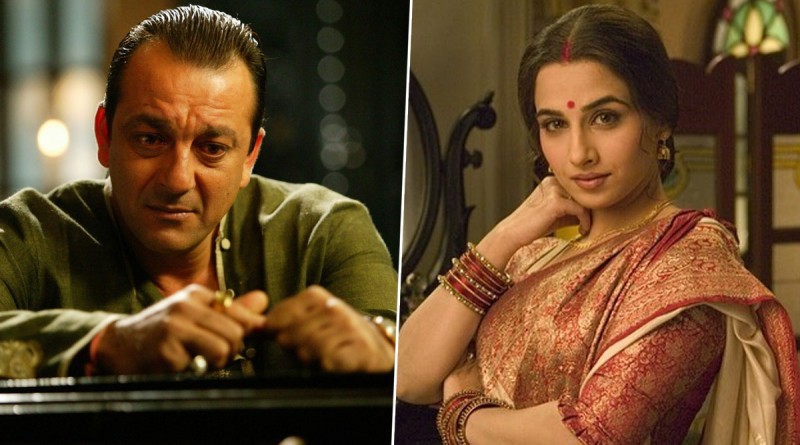
Time-traveling and evoking emotions that are frequently impossible for words alone to do so are both amazing abilities of music. A long-standing tradition in Indian cinema is the marriage of uplifting music and moving narrative. "Parineeta," a 2005 movie produced and directed by Vidhu Vinod Chopra and Pradeep Sarkar, is one such lovely example. In addition to weaving a captivating love story between the characters of Girish (played by Sanjay Dutt) and Lolita (played by Vidya Balan), the movie pays a sincere tribute to another well-known song from Chopra's discography, "Ek Ladki Ko Dekha" from the movie "1942: A Love Story." The musical relationship between "Parineeta" and "1942: A Love Story" is discussed in this article along with how it enriches the film's emotional impact.
For generations of Bollywood fans, "Ek Ladki Ko Dekha" has been associated with a timeless melody that will never fade from their memories. This song, which was written by Javed Akhtar and composed by the legendary R.D. Burman, perfectly expresses love in its most basic form. The song, sung by Kumar Sanu, went viral as soon as it was released in 1994 through the movie "1942: A Love Story." Its success was credited to both the memorable picturization, which starred Anil Kapoor and Manisha Koirala, as well as the song's sweet melody.
Since then, the song has evolved into a love anthem that is frequently used in Bollywood movies to represent the magic of first love. But it wasn't until "Parineeta" that the song discovered a special interpretation that added a new level of nuance and significance.
"Parineeta," a love story set in Kolkata in the 1960s, is a film adaptation of Sarat Chandra Chattopadhyay's Bengali novella of the same name. With lyrics written by Swanand Kirkire, Shantanu Moitra created the music for the movie. The "Parineeta" soundtrack was a breath of fresh air, fusing the romanticism of love's timeless essence with the old-world charm of Kolkata.
When we first see the on-screen interaction between the characters of Girish and Lolita, it is clear that "Parineeta" and "1942: A Love Story" share a musical connection. The introduction of a musical motif occurs each time these two characters come into contact or exchange an important glance. The motif in question is a brief passage from "Ek Ladki Ko Dekha."
It was a brilliant move for "Parineeta" to use a section of "Ek Ladki Ko Dekha" as part of the soundtrack. It does more than just use a song; it also adds a layer of profound symbolism and meaning to the storyline of the movie.
First love and nostalgia: The song "Ek Ladki Ko Dekha" from "1942: A Love Story" is all about that first experience with love and perfectly captures the essence of adolescent infatuation. Girish and Lolita's characters in "Parineeta" have a complicated past that includes love, separation, and reconciliation. Similar to how the characters themselves recall their first meeting, the use of this well-known song highlights the nostalgia and enduring love between them.
The Unspoken Emotions: In both films, the soundtrack serves as a vehicle for suppressed feelings. The song expresses the protagonist's emotions in "1942: A Love Story," while in "Parineeta," it reflects Girish and Lolita's silent love. The mere presence of this musical motif deepens their feelings because it expresses what words frequently fail to do.
The Movement of Time: "Parineeta" is set in the 1960s, while "1942: A Love Story" is set in the pre-independence era. The same musical motif is used in both films, bridging the gap in time and creating a lovely continuity that spans the decades. It serves as a reminder that love is timeless and unending in all of its pure form.
Vidhu Vinod Chopra's Cinematic Universe: Through this musical homage, the producer of both films, Vidhu Vinod Chopra, connects his cinematic universe subtly. The fact that these stories, despite having different narratives, have a common theme of love and its many manifestations is a hint to the audience.
"Ek Ladki Ko Dekha"'s inclusion in "Parineeta" struck a powerful chord with the audience. It was more than just a passing musical allusion; it was a potent plot device that heightened the movie's emotional impact. A rush of nostalgia overcame viewers who had grown up watching "1942: A Love Story" as they were transported back in time. The magic of the song also compelled people who had never heard it before to learn more about the song's historical context.
The incorporation of a brief passage from "Ek Ladki Ko Dekha" into the plot of "Parineeta" was truly remarkable. The emotional depth of the movie was increased by this musical homage, which also highlighted the enduring strength of love and built a connection between two different cinematic universes. It served as a reminder that despite the passage of time, love endures as the unchanging, unfathomable force that unites all people.
The fact that "Parineeta" and "1942: A Love Story" are connected by this well-known song is proof of the filmmakers' inventiveness. It serves as a reminder that some songs are destined to resound across generations and continue to touch hearts for years to come. It demonstrates the profound impact that music can have on the cinematic experience.
'Kahaani' as the Game Changer for Nawazuddin Siddiqui
How 'Shaadi Ke Side Effects' Balanced On-Screen Infants
Saif Ali Khan's Real-Life Struggles Highlighted in 'Go Goa Gone'